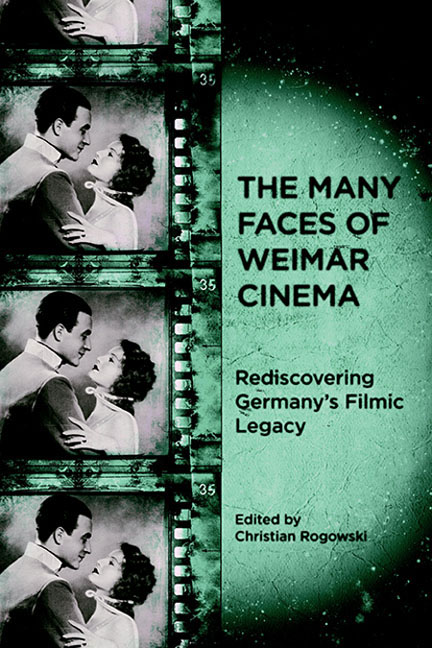Book contents
- Frontmatter
- Contents
- List of Illustrations
- Preface
- Introduction: Images and Imaginaries
- 1 Richard Oswald and the Social Hygiene Film: Promoting Public Health or Promiscuity?
- 2 Unsettling Nerves: Investigating War Trauma in Robert Reinert's Nerven (1919)
- 3 Humanity Unleashed: Anti-Bolshevism as Popular Culture in Early Weimar Cinema
- 4 Desire versus Despotism: The Politics of Sumurun (1920), Ernst Lubitsch's “Oriental” Fantasy
- 5 Romeo with Sidelocks: Jewish-Gentile Romance in E. A. Dupont's Das alte Gesetz (1923) and Other Early Weimar Assimilation Films
- 6 “These Hands Are Not My Hands”: War Trauma and Masculinity in Crisis in Robert Wiene's Orlacs Hände (1924)
- 7 The Star System in Weimar Cinema
- 8 Schaulust: Sexuality and Trauma in Conrad Veidt's Masculine Masquerades
- 9 The Musical Promise of Abstract Film
- 10 The International Project of National(ist) Film: Franz Osten in India
- 11 The Body in Time: Wilhelm Prager's Wege zu Kraft und Schönheit (1925)
- 12 Henrik Galeen's Alraune (1927): The Vamp and The Root of Horror
- 13 The Dialectic of (Sexual) Enlightenment: Wilhelm Dieterle's Geschlecht in Fesseln (1928)
- 14 Babel's Business — On Ufa's Multiple Language Film Versions, 1929–1933
- 15 “A New Era of Peace and Understanding”: The Integration of Sound Film into German Popular Cinema, 1929–1932
- 16 Landscapes of Death: Space and the Mobilization Genre in G. W. Pabst's Westfront 1918 (1930)
- 17 Undermining Babel: Victor Trivas's Niemandsland (1931)
- 18 Unmasking Brigitte Helm and Marlene Dietrich: The Vamp in German Romantic Comedies (1930–33)
- Filmography
- Notes on the Contributors
- Index
4 - Desire versus Despotism: The Politics of Sumurun (1920), Ernst Lubitsch's “Oriental” Fantasy
Published online by Cambridge University Press: 29 April 2017
- Frontmatter
- Contents
- List of Illustrations
- Preface
- Introduction: Images and Imaginaries
- 1 Richard Oswald and the Social Hygiene Film: Promoting Public Health or Promiscuity?
- 2 Unsettling Nerves: Investigating War Trauma in Robert Reinert's Nerven (1919)
- 3 Humanity Unleashed: Anti-Bolshevism as Popular Culture in Early Weimar Cinema
- 4 Desire versus Despotism: The Politics of Sumurun (1920), Ernst Lubitsch's “Oriental” Fantasy
- 5 Romeo with Sidelocks: Jewish-Gentile Romance in E. A. Dupont's Das alte Gesetz (1923) and Other Early Weimar Assimilation Films
- 6 “These Hands Are Not My Hands”: War Trauma and Masculinity in Crisis in Robert Wiene's Orlacs Hände (1924)
- 7 The Star System in Weimar Cinema
- 8 Schaulust: Sexuality and Trauma in Conrad Veidt's Masculine Masquerades
- 9 The Musical Promise of Abstract Film
- 10 The International Project of National(ist) Film: Franz Osten in India
- 11 The Body in Time: Wilhelm Prager's Wege zu Kraft und Schönheit (1925)
- 12 Henrik Galeen's Alraune (1927): The Vamp and The Root of Horror
- 13 The Dialectic of (Sexual) Enlightenment: Wilhelm Dieterle's Geschlecht in Fesseln (1928)
- 14 Babel's Business — On Ufa's Multiple Language Film Versions, 1929–1933
- 15 “A New Era of Peace and Understanding”: The Integration of Sound Film into German Popular Cinema, 1929–1932
- 16 Landscapes of Death: Space and the Mobilization Genre in G. W. Pabst's Westfront 1918 (1930)
- 17 Undermining Babel: Victor Trivas's Niemandsland (1931)
- 18 Unmasking Brigitte Helm and Marlene Dietrich: The Vamp in German Romantic Comedies (1930–33)
- Filmography
- Notes on the Contributors
- Index
Summary
Many critics have attacked Lubitsch's historical costume films for their distortion of history, among others Siegfried Kracauer (48) and Lotte Eisner (82) in their canonical books on Weimar Cinema. In Lubitsch's defense, arguments have been made that these films are escapist fantasies made by a director who was relatively oblivious to politics (even the revolutionary turmoil on the streets of Berlin in the aftermath of the First World War). For instance, Hans Helmut Prinzler, one of the film historians interviewed in Robert Fischer's documentary film Ernst Lubitsch in Berlin, argues that Lubitsch simply didn't pay attention to politics. Pola Negri, the famous female actor who starred in a number of Lubitsch's films of this period, explained the success of the first of Lubitsch's costume films, Die Augen der Mumie Ma (The Eyes of the Mummy Ma, 1918), as a product of “its intensely romantic oriental fatalism,” which was “precisely the kind of escapism that a war-weary people craved for” (140). No one would claim that Lubitsch's primary agenda as a filmmaker was political — although much later in Hollywood he did start production of an overtly anti-Nazi film, To Be or Not To Be, in the fall of 1941, while the United States was still officially neutral.
It is true that throughout his career Lubitsch primarily made comedies and “escapist fantasies.” But even “escapist fantasies” have politics; that is, they can be read politically, and the aim of this essay is to explore the politics of his “oriental” costume film, Sumurun. The film is clearly a fantasy without any clear historical referent other than a vague connection to the tales in Arabian Nights (as implied in the film's American release title, One Arabian Night). Thus historical “distortion” is not at issue here in the same way it is for Lubitsch's historical films about the mistress of France's Louis XV, Madame Dubarry (1919; American release title Passion) and the second wife of England's Henry VIII, Anna Boleyn (1920; American release title Deception). This does not make Kracauer any kinder to Sumurun, which he accuses of “melodramatic sentimentality” (52). Nonetheless, I would maintain that the politics of Lubitsch's “ahistorical” and “apolitical” films — the comedies as well as the costume films —always involve a very frank portrayal of conflicts around sex, gender, class, and power.
- Type
- Chapter
- Information
- The Many Faces of Weimar CinemaRediscovering Germany's Filmic Legacy, pp. 67 - 83Publisher: Boydell & BrewerPrint publication year: 2010



